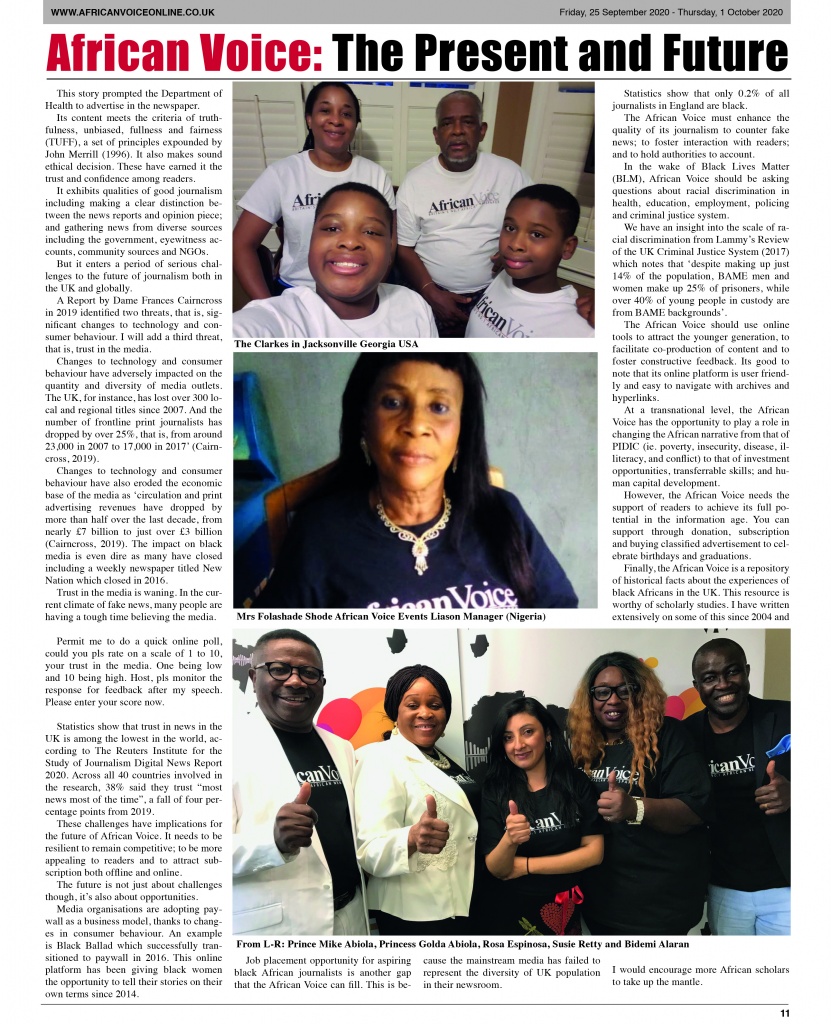

By Prof Ola Ogunyemi – It gives me a great pleasure to speak at this event to commemorate the 19th year anniversary of the African Voice newspaper.
My speech will reflect on the roles the newspaper is playing to project the voice of black Africans and on the challenges to the future of journalism both in the UK and globally.
I have been associated with the newspaper since 2003 for research purpose and was made the editorial board adviser in 2009. So, I am addressing you today from the knowledge of the media industry both as a practitioner and a scholar.
The population of Black Africans in the UK grew exponentially in the 1980s because of political and economic instabilities in Africa on the one hand; and the urge to further their education and enhance career development on the other.
This new generation Africans need a media to meet their culturally specific information, entertainment and education needs. But the mainstream media was not geared to meet their tastes and preferences.
The Voice, which was established in 1982, did not meet their information needs because it represents the interest of African Caribbean and works to facilitate community cohesion to prevent the repeat of the 1981 Brixton riot in London.
Therefore, the arrival of the African Voice fills a vacuum and serves as a platform for celebrating their achievements and raising awareness about their civic concerns.
But as the editor will attest, the road has been rough and bumpy. Establishing and sustaining a strong press for black Africans in the UK is not a mean fit. I give kudos to the editor, Mike Abiola, for his passion for journalism and to the rest of the editorial team. The editor did not just perceive the newspaper as a business but as a social good to serve the black Africans, who have been subjected to marginalisation and negative stereotyping in the mainstream media.
The editor has revamped its operation over the years to enhance the brand and its appeal to wider demographics.
Readership statistics indicate that the African Voice reaches 45% first generation immigrants, 40% British born second generation, 5% short/medium stay visitors and holidaymakers from the African continent, and 10% British based non-Africans with an interest in African affairs.
The newspaper has been using its voice responsibly over the years to serve the black Africans. During the C19 pandemic for instance, it did not promote the fake news about G5 mobile technology or the misleading message by the Kingdom Church in Camberwell, London, regarding a fake C19 cure, in the form of a bottle of oil and some red yarn, which the vicar claimed would protect his followers from the virus.
It has a good record of investigative journalism. During the Swine Flu epidemic in 2009, it found that some black Africans regarded Swine Flu as a white man’s disease, thereby, treating it like a moderate flu and using local traditional medicine which was contrary to government advice. This story prompted the Department of Health to advertise in the newspaper.
Its content meets the criteria of truthfulness, unbiased, fullness and fairness (TUFF), a set of principles expounded by John Merrill (1996). It also makes sound ethical decision. These have earned it the trust and confidence among readers.
It exhibits qualities of good journalism including making a clear distinction between the news reports and opinion piece; and gathering news from diverse sources including the government, eyewitness accounts, community sources and NGOs.
But it enters a period of serious challenges to the future of journalism both in the UK and globally.
A Report by Dame Frances Cairncross in 2019 identified two threats, that is, significant changes to technology and consumer behaviour. I will add a third threat, that is, trust in the media.
Changes to technology and consumer behaviour have adversely impacted on the quantity and diversity of media outlets. The UK, for instance, has lost over 300 local and regional titles since 2007. And the number of frontline print journalists has dropped by over 25%, that is, from around 23,000 in 2007 to 17,000 in 2017’ (Cairncross, 2019).
Changes to technology and consumer behaviour have also eroded the economic base of the media as ‘circulation and print advertising revenues have dropped by more than half over the last decade, from nearly £7 billion to just over £3 billion (Cairncross, 2019). The impact on black media is even dire as many have closed including a weekly newspaper titled New Nation which closed in 2016.
Trust in the media is waning. In the current climate of fake news, many people are having a tough time believing the media.
Permit me to do a quick online poll, could you pls rate on a scale of 1 to 10, your trust in the media. One being low and 10 being high. Host, pls monitor the response for feedback after my speech. Please enter your score now.
Statistics show that trust in news in the UK is among the lowest in the world, according to The Reuters Institute for the Study of Journalism Digital News Report 2020. Across all 40 countries involved in the research, 38% said they trust “most news most of the time”, a fall of four percentage points from 2019.
These challenges have implications for the future of African Voice. It needs to be resilient to remain competitive; to be more appealing to readers and to attract subscription both offline and online.
The future is not just about challenges though, it’s also about opportunities.
Media organisations are adopting paywall as a business model, thanks to changes in consumer behaviour. An example is Black Ballad which successfully transitioned to paywall in 2016. This online platform has been giving black women the opportunity to tell their stories on their own terms since 2014.
Job placement opportunity for aspiring black African journalists is another gap that the African Voice can fill. This is because the mainstream media has failed to represent the diversity of UK population in their newsroom. Statistics show that only 0.2% of all journalists in England are black.
The African Voice must enhance the quality of its journalism to counter fake news; to foster interaction with readers; and to hold authorities to account.
In the wake of Black Lives Matter (BLM), African Voice should be asking questions about racial discrimination in health, education, employment, policing and criminal justice system.
We have an insight into the scale of racial discrimination from Lammy’s Review of the UK Criminal Justice System (2017) which notes that ‘despite making up just 14% of the population, BAME men and women make up 25% of prisoners, while over 40% of young people in custody are from BAME backgrounds’.
The African Voice should use online tools to attract the younger generation, to facilitate co-production of content and to foster constructive feedback. Its good to note that its online platform is user friendly and easy to navigate with archives and hyperlinks.
At a transnational level, the African Voice has the opportunity to play a role in changing the African narrative from that of PIDIC (ie. poverty, insecurity, disease, illiteracy, and conflict) to that of investment opportunities, transferrable skills; and human capital development.
However, the African Voice needs the support of readers to achieve its full potential in the information age. You can support through donation, subscription and buying classified advertisement to celebrate birthdays and graduations.
Finally, the African Voice is a repository of historical facts about the experiences of black Africans in the UK. This resource is worthy of scholarly studies. I have written extensively on some of this since 2004 and I would encourage more African scholars to take up the mantle.
Kindly follow us on twitter:@AfricanVoice2












